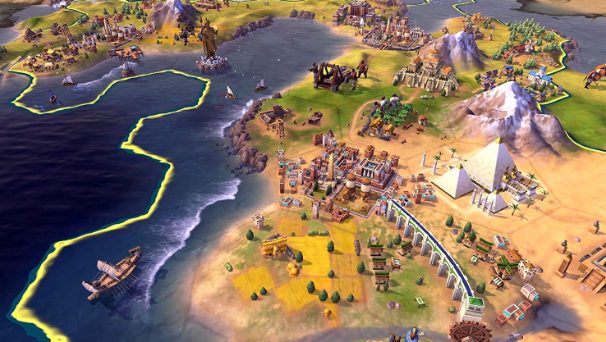Introduction: Civilization VI, often abbreviated as Civ 6, is the sixth installment in the long-running and iconic Civilization series, a turn-based strategy game developed by Firaxis Games. This game offers a deep and engaging experience that combines strategy, diplomacy, science, culture, and warfare to challenge players in building and maintaining their own civilization. In this article, we will explore the pros and cons of Civilization VI, provide a detailed gameplay guide, and suggest five alternative games for those looking for similar experiences.
Also read: 10 Best Card Games For Car Road Trips
Pros of Civilization VI:
- Strategic Depth: Civilization VI is renowned for its strategic depth. Players are tasked with making important decisions at every turn, from managing resources to diplomatic relations and military tactics. The game encourages careful planning, which makes each playthrough unique.
- Immersive World Building: The game provides an immersive world-building experience. Players can choose from a variety of historical leaders and civilizations, each with unique abilities, units, and historical context. As you build your civilization, you’ll watch it evolve from a small settlement to a sprawling empire, which is visually satisfying.
- Multiplayer and AI: Civilization VI offers both single-player and multiplayer modes. You can challenge your friends or play against AI opponents, which provide different levels of difficulty. The AI in this game is relatively intelligent, offering a good challenge even for experienced players.
- Engaging Diplomacy: Diplomacy in Civilization VI is intricate and engaging. You can form alliances, make trade agreements, negotiate peace treaties, and engage in espionage. The AI leaders have distinct personalities and will react differently to your actions, adding depth to the diplomatic aspect of the game.
- Cultural and Technological Progress: The game features well-designed tech trees and civic trees, allowing players to make choices that impact their civilization’s cultural and technological development. Progressing along these paths opens up new possibilities and abilities, providing a sense of accomplishment as your civilization advances.
- Varied Victory Conditions: Civilization VI offers several victory conditions, such as Domination (military conquest), Science (reaching the stars), Culture (cultural dominance), Religion (religious dominance), and Diplomacy (World Congress victory). This variety ensures that there are multiple paths to success, catering to different playstyles.
- Expansive Modding Community: Civilization VI has a thriving modding community, allowing players to customize and enhance their gaming experience. Mods can range from cosmetic changes to complete gameplay overhauls, extending the game’s replayability.
- Ongoing Support and Expansions: Firaxis Games has consistently released expansions and updates for Civilization VI, adding new civilizations, leaders, gameplay mechanics, and balancing changes. This post-launch support keeps the game fresh and exciting.
- Beautiful Art and Sound Design:The game’s art and sound design are top-notch. The visuals are colorful and detailed, and the soundtrack provides an immersive experience that complements the gameplay.
- Educational Value: Civilization VI is often praised for its educational aspects, as it encourages players to learn about historical leaders, civilizations, and events. It can be a fun way to explore history and geography.
Cons of Civilization VI:
- Steep Learning Curve: Civilization VI has a steep learning curve, making it intimidating for new players. The game is filled with complex systems and mechanics that may take a while to grasp fully.
- Time-Consuming: A single game of Civilization VI can be incredibly time-consuming. It’s not uncommon for a single playthrough to take several hours, if not days, which may not be ideal for players with limited free time.
- AI Quirks: While the AI in Civilization VI is generally competent, it can exhibit occasional quirks and irrational behavior, which can be frustrating.
- Late-Game Slowness: As the game progresses and civilizations expand, turns can take longer to process, leading to late-game sluggishness. This issue can be exacerbated on lower-end computers.
- DLC Costs: While ongoing support and expansions are a positive aspect of Civilization VI, the cost of DLCs can add up significantly, making it an expensive game in the long run for players who want the complete experience.
- Balance Issues: Despite ongoing updates and expansions, some players have noted balance issues, with certain civilizations or strategies being more powerful than others. This can affect the competitive aspect of the game.
- Limited Diplomatic Options: Diplomacy, while engaging, can be somewhat limited in its scope. Players may find that AI leaders’ responses and diplomatic options become repetitive over time.
- Limited Victory Conditions: While the victory conditions in Civilization VI are diverse, some players may find that the options are still somewhat limited compared to their preferences.
- Microtransactions: Civilization VI includes some microtransactions for cosmetic items and additional content. While these are not essential for gameplay, they can be seen as an added cost for players who want to enhance their experience.
- Lack of Transparent Information: The game’s interface could be more transparent in conveying information about various game mechanics, making it challenging for new players to understand certain aspects without external resources.
How to Play Civilization VI:
- Choosing Your Civilization: At the start of the game, you’ll need to select a civilization to lead. Each civilization has unique abilities, units, and buildings. Consider your preferred playstyle and strategy when choosing.
- Exploration: Begin by exploring the world. Your initial settlers should establish a city, and your first units should scout the surroundings. Uncover valuable resources, natural wonders, and potential city locations.
- City Management: Cities are the heart of your civilization. Manage resources, production, growth, and culture. Building the right infrastructure and districts is crucial for success.
- Diplomacy: Interact with AI leaders and other civilizations. Form alliances, establish trade routes, and negotiate for mutual benefits. Remember that each leader has a unique personality, and their reactions will vary.
- Research and Civics: Progress along the tech tree to unlock new units and buildings, while advancing along the civic tree to gain policy cards and government bonuses.
- Military Strategy: Build an army to protect your civilization and expand your territory. Engage in combat when necessary, but be mindful of diplomacy and the potential consequences of war.
- Culture and Tourism: Cultivate your culture and tourism to attract tourists from other civilizations. Achieving a cultural victory requires a strong cultural influence over other civilizations.
- Victory Conditions: Keep your chosen victory condition in mind. Whether you aim for domination, science, culture, religion, or diplomacy, tailor your actions to suit your goal.
- Ongoing Decisions: Throughout the game, you’ll need to make various decisions, such as where to settle new cities, which policies to adopt, and how to allocate resources. Consider each decision carefully.
- Adapt and Learn: Civilization VI is a game of adaptation. Learn from each playthrough, refine your strategies, and experiment with different civilizations to discover new ways to succeed.
Alternatives to Civilization VI:
- Endless Legend: Endless Legend is a turn-based strategy game with a fantasy setting. It offers diverse factions, a rich storyline, and unique gameplay mechanics.
- Stellaris: Stellaris is a real-time grand strategy game by Paradox Interactive. It focuses on space exploration, empire building, and diplomacy in a vast, procedurally generated universe.
- Age of Wonders: Planetfall: This is a sci-fi turn-based strategy game with a focus on tactical combat, empire building, and diplomacy. It offers a futuristic setting with various playable factions.
- Total War: Three Kingdoms: Total War games blend turn-based strategy with real-time battles. Three Kingdoms is set in ancient China and focuses on character-driven narratives and large-scale warfare.
- Rise of Nations: Rise of Nations combines elements of real-time strategy with turn-based strategy. It spans a vast timeline of history, allowing you to build and lead your nation through different ages.
Also read: The Evolution Of Online Gaming: A Journey Through Technological Advancements
Conclusion:
Civilization VI is a celebrated game in the turn-based strategy genre, known for its depth, historical context, and challenging gameplay. While it has its share of pros and cons, it remains a must-play for strategy enthusiasts. With a thriving modding community and ongoing support, it continues to evolve and improve. If you’re looking for alternatives, the mentioned games offer a range of strategic experiences, each with its unique setting and gameplay mechanics. Whether you’re building an empire on Earth or exploring the cosmos, these games can satisfy your strategic cravings and provide countless hours of entertainment.
Iva Ort is an ingenious wordsmith and captivating blogger whose tales leap off the screen and into your imagination. With a pen as her wand, she weaves enchanting stories and insightful articles, leaving readers spellbound and craving more.

